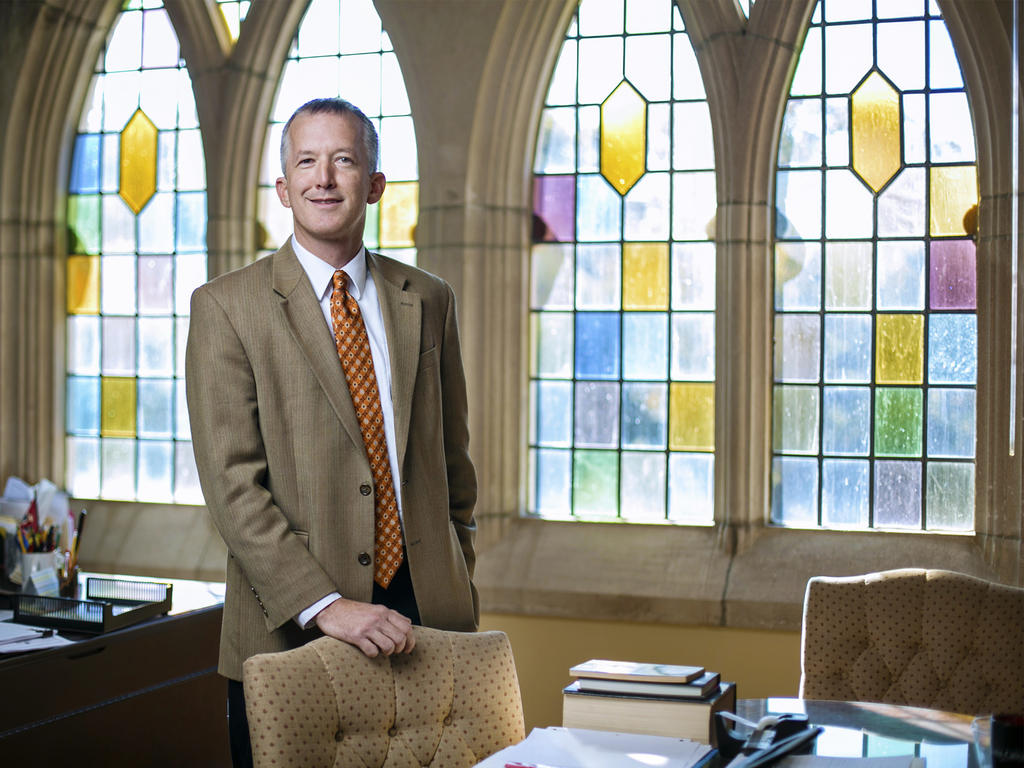By Emily Clark ’15
“In some ways, it was just like a normal lecture. You have a text and a glass of water and you’re standing up at the podium, about to speak. But then you look around and realize that you’re in the most extravagant and stately room you’ve ever spoken in. And you have an Associate Justice of the Supreme Court sitting in front of you, who just introduced you moments before.” Professor Huebner shook his head. “It was an incredible experience.”
On October 16th Professor Timothy Huebner, the current Irma O. Sternberg Professor and Chair of the Department of History, delivered a lecture in the courtroom of the United States Supreme Court as part of the Supreme Court Historical Society’s Leon Silverman lecture series. He was the third of four speakers selected to lecture on the theme of the Civil War, in honor of the 150-year anniversary of the conflict. Huebner’s lecture, titled “’The Unjust Judge’: Roger B. Taney, the Slave Power, and the Meaning of Emancipation,” focused specifically on the implications of Chief Justice Taney’s death in the Northern states during the Civil War, and how the reactions to Taney’s death across the country help us understand how Americans made sense of the war.
According to Huebner, while Taney freed all his slaves at a young age, he eventually grew to be “the most visible symbol of what the South stood for in the North,” as the Chief Justice who delivered the majority opinion in the Dred Scott v. Sandford case. Because of this and the polarizing opinions of Taney across the country before and during the Civil War, Huebner finds him “endlessly interesting.” He is often juxtaposed with Lincoln, and is an important and compelling figure in American history.
Huebner described the entire speaking experience as “exhilarating”; as associate editor of the Journal of Supreme Court History since 2010, he has been present for other lectures in the space, but this was the first time he had the honor of being the distinguished speaker. However, this is not the first time Huebner has written and presented on Taney. As a scholar of the American South and the United States Constitution, Huebner has often encountered Taney in his academic career. Since earning his Ph.D., he has published two books, The Southern Judicial Tradition: State Judges and Sectional Distinctiveness, 1790-1890, andThe Taney Court: Justices, Ruling, and Legacy. In 2010, he published an important scholarly article on Taney in the Journal of American History, and his op-ed piece “The Death of Taney” recently appeared in the New York Times Opinionator Disunion blog. Currently, he is working on a book entitledLiberty and Union: The Civil War Era and American Constitutionalism, in which Taney is one of many Civil War characters featured. “I argue in the book that constitutional ideals aren’t just ideals held by presidents and chief justices,” Huebner explains. “They are held by average citizens who go off to fight on both sides of the war. African American activists, those who had been held as slaves—all of them had aspirations for freedom and an understanding of what it meant to be an American. They claimed the heritage of American constitutional liberty as they were fighting for their freedom. I’m arguing that all these people, even though they’re at war with each other, have something in common, and it is that they harken back to the views of the founding of our country as they make their arguments for what they’re fighting for.” The book, which Huebner started working on in 2006, will be published in 2016 by the University Press of Kansas.
In the classroom at Rhodes, Huebner shows the same passion for history as he did during the Supreme Court lecture series. History major Lanier Flanders ‘15 says, “I cannot imagine my time at Rhodes without Professor Huebner as my advisor and instructor. His animated teaching style invigorates students to immerse themselves in the class material. His passion for history is undeniable, just as his compassion for students is clearly evident.” Senior history-philosophy double major Sam Mattson echoes that sentiment. “It is obvious how much he cares about our education, and his enthusiasm and knowledge transfers into the classroom,” Sam explains. “I leave class each day feeling like I learned about as much as you can in two hours.” Professor Huebner teaches a variety of classes at Rhodes, ranging from lower-level introductory courses to Senior Seminar, on topics that include Constitutional history, Supreme Court history, Civil War history, and other subjects related to the American South.
Huebner’s impact is not limited to history majors. As part of the Rhodes Foundation requirements, each student must complete a class that teaches them to “understand how historical forces have shaped human culture” before they graduate. For Huebner, this is an essential part of a liberal arts education. “Liberal education is all about understanding that all of us live in a tradition. All of us live within a context. We are not growing out of a vacuum. All of us live in a historical and social context, and understanding that is essential to getting a liberal education. We can’t understand who we are in the most basic sense if we don’t know anything about the context and the history from which we come.”
Professor Huebner’s lecture aired on C-SPAN on November 8th and can be viewed online here: http://www.c-span.org/video/?321985-1/discussion-chief-justice-roger-taney-civil-war. The lecture will also be published in article form in theJournal of Supreme Court History in 2015.
